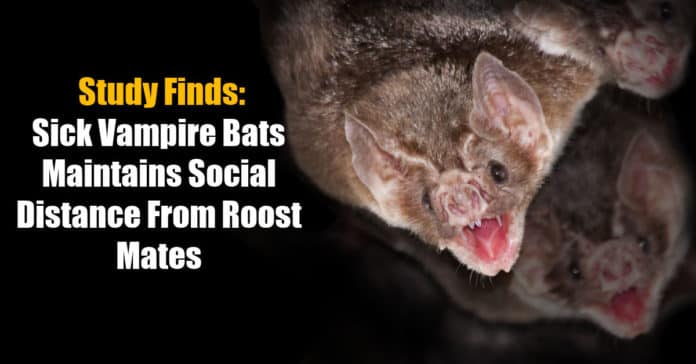Sick Vampire Bats Maintains Social-Distance From Groupmates
Bats have long been a poor online reputation, even prior to COVID-19 appeared. These extremely mobile animals that stay in gathered colonies are widely known reservoirs of viruses, including coronaviruses, that, as we have seen, can transmit into human beings.
However, these innocent animals are unfairly tainted. They are essential pollinators and pest controllers.
A novel study reveals that, when bats really feel ill, they normally show their own type of social distancing practices, similar to the procedures we have had actually adopted to contain the COVID-19 spread.
The research study had researchers tagging a team of wild vampire bats from a colony in Lamanai, Belize, and monitoring their social encounters every couple of seconds over a few days. When a substance was injected into the bats, which activated their body immune systems, the ‘unwell’ bats clearly altered their behavior and became less social.
Simon Ripperger, a bat researcher from Ohio State University said that in the wild, [they observed] vampire bats – which are highly social animals – maintain social-distance when they are ill or staying with ill groupmates. And as a result, it can be anticipated that they lower the spread of disease.
A prior study from this team of scientists had revealed that, in captivity, sick bats sleep much more, move less, spend less time grooming other bats, and make fewer social calls (which typically attract their companions). The scientists refer to this as ”sickness behavior’.
Ripperger said that they certainly wished to examine whether these behavioral variations also happen in a natural setup where the bats are within their natural social and physical conditions.
Accumulating information on social interactions between bats would be useful if scientists want to forecast how sickness behavior can decrease the disease spread in these animals, as social distancing does in human beings.
Hence, the scientists evaluated information from a quickly captured group of 31 typical vampire bats (Desmodus rotundus), from a colony roosting inside a hollow tree.
16 randomly picked female bats were infused with a compound to trigger their immune system, which made them feel ill for a couple of hours however, didn’t cause any actual illness. Another 15 bats were injected with salty water as a placebo.
Small sensors, each weighing less than a penny, fixed to the ‘sick’ and healthy bats before they went back to their roost.

Ripperger claimed that the sensing units provided them the possibility to automatically monitor the behavior of a whole social group, instead of focal sample individuals at a time, what one generally performs in a laboratory setting, which was an excellent measure.
The custom sensors, created by Ripperger and his associates, function by transmitting a signal every 2 seconds that ‘wakes up’ any neighboring sensing units (affixed to bats) within 5-10 m.
Every single time this occurred in the 3 days after the bats were captured and released, the sensing units noted an encounter. The researchers could determine when 2 bats came into close contact with each other, as well as the duration with the strength and duration of the pairwise signal.
Gerald Carter, behavioral ecologist, Ohio State University stated that they concentrated on 3 actions of the ill bats’ behaviors:
How many various other bats they encountered, How much overall time they spent with others, and How well-connected they were to the entire social network.
The network analysis reveals that ‘sick’ bats were less socially linked to their healthy, social roost mates.
In the initial 6-hour window after therapy, an ‘unwell’ bat had on typical 4 fewer encounters than a control bat, and ‘sick’ bats spent very less duration (25 mins less) communicating with each other.
As anticipated, 2 days later, once the therapy had actually subsided and the ‘sick’ bats were feeling better, they mostly continued their regular social behaviors.
Ripperger stated that it was so impressive that the result was so clearly evident.
Even without a complex statistical evaluation, what is going on was directly seen from the social networks.
It must be kept in mind that due to the fact that the scientists really did not infect the vampire bats with an original pathogen, they didn’t determine the spread of actual disease in a bat roost, which could influence bat behavior in other means.
Carter stated that it is vital to note that changes in behavior depending on the virus as well. Few actual diseases may make interactions more likely, not less, or they may result in unwell bats being avoided.
The research additionally only focused on a little group of bats within a single roost.
Monitoring how bats move and interact between colonies will certainly be a bigger challenge, particularly as researchers are only finding the significant distances that bats travel – even 1000s of Kms per year – between roosts.
The results of the study were released in the journal Behavioral Ecology.
Sick Vampire Bats maintains Social-Distance from groupmates



